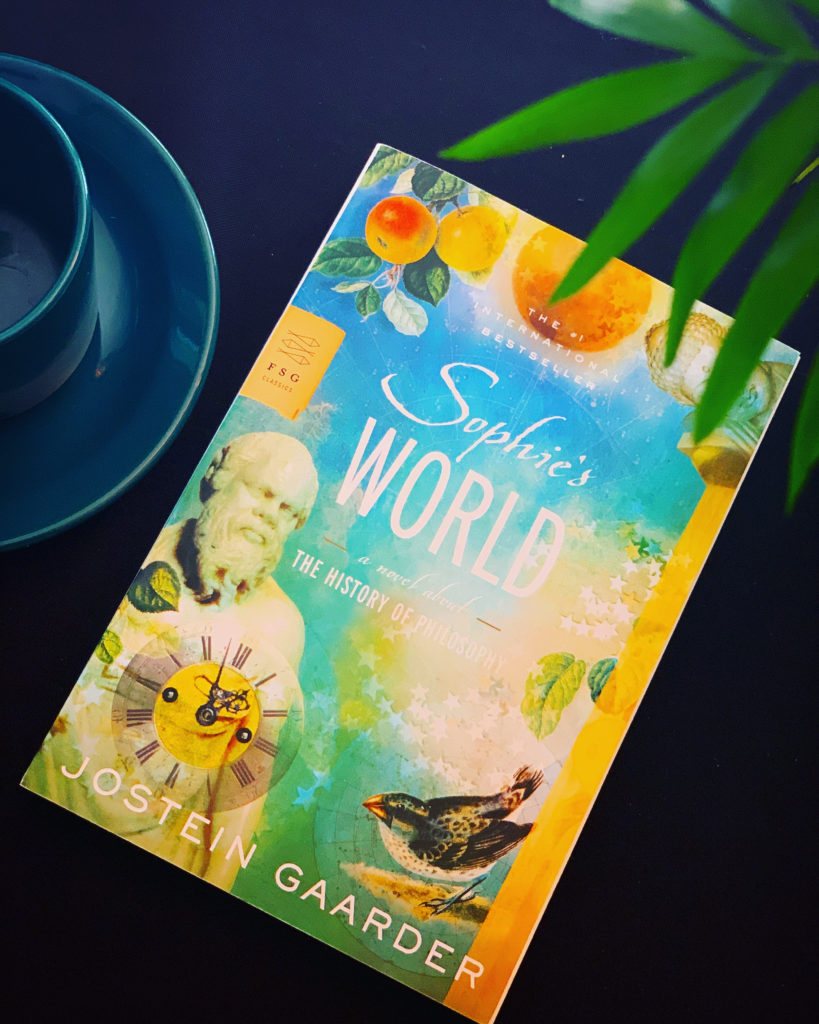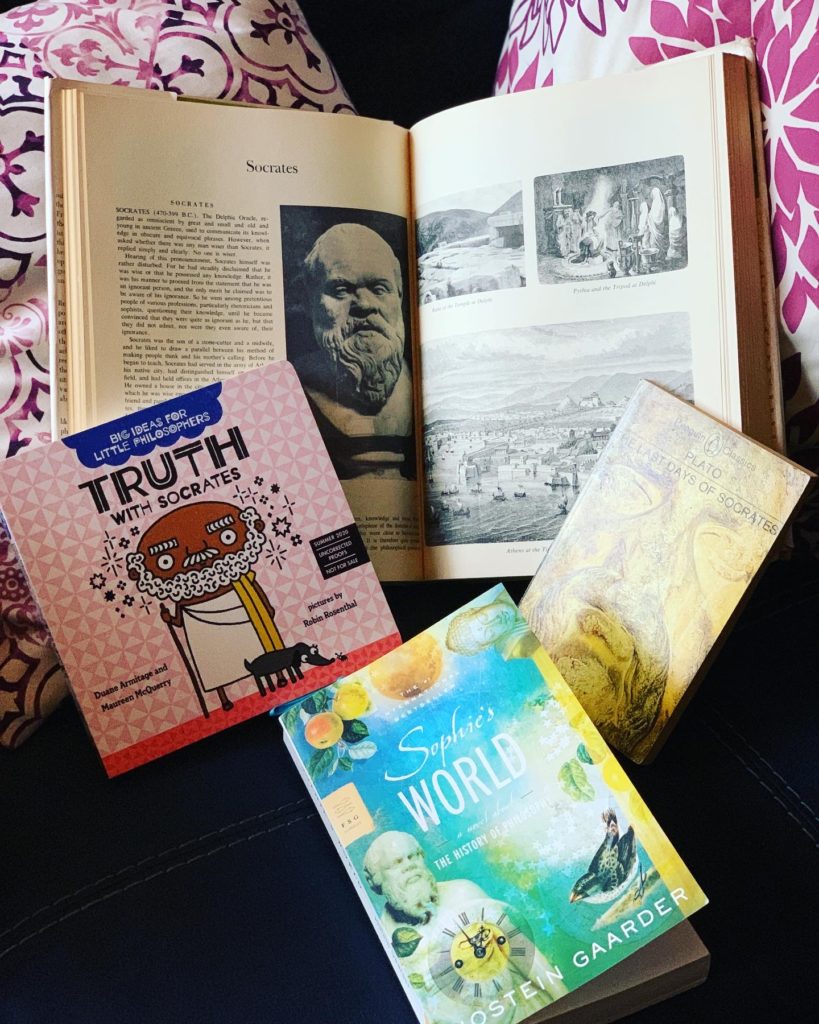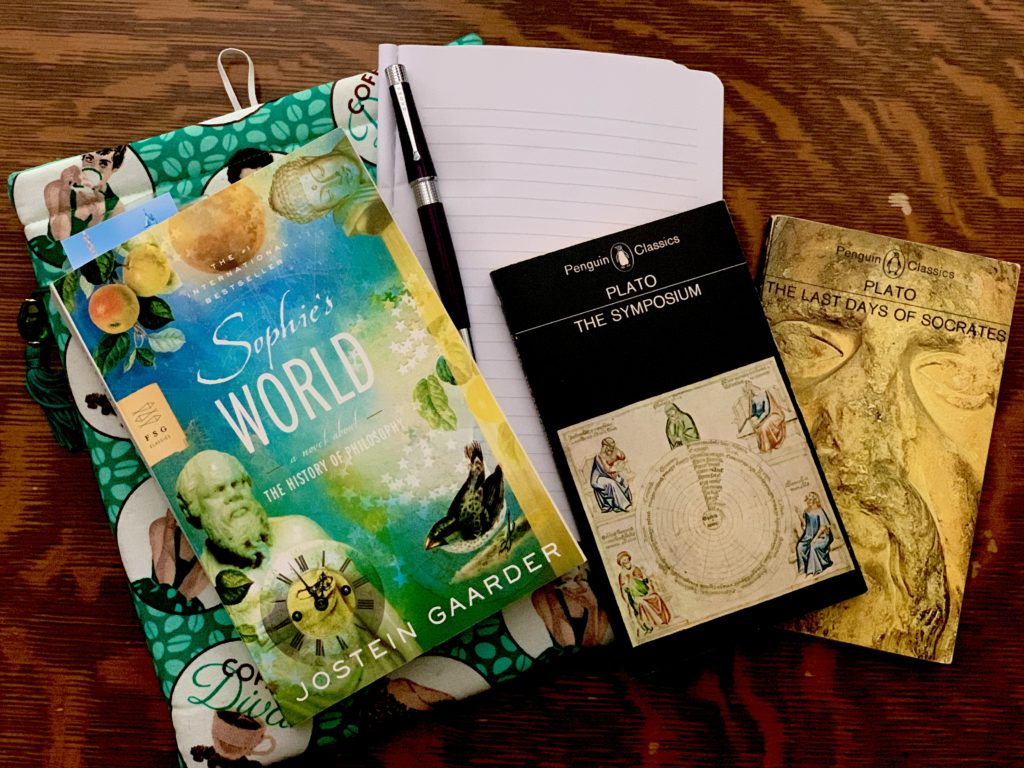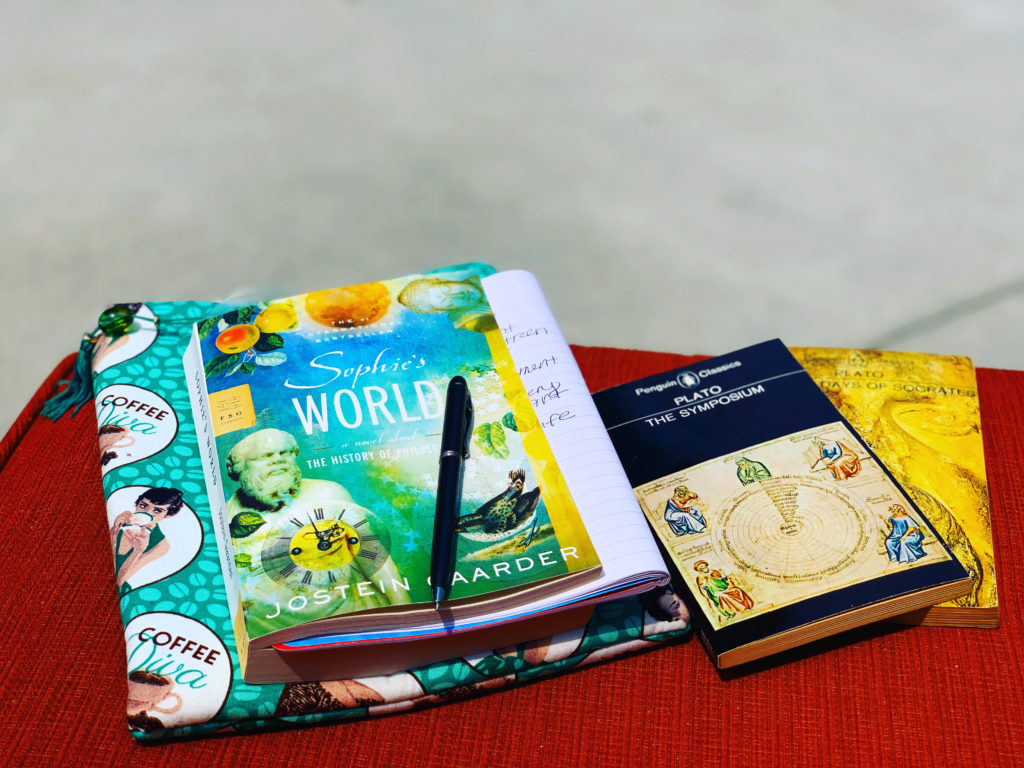Philosophy

Sophie’s World is a 1991 novel by Norwegian writer Jostein Gaarder. It follows Sophie Amundsen, a Norwegian teenager who is introduced to the history of philosophy by Alberto Knox, a middle-aged philosopher. Sophie’s World became a best-seller in Norway and won the Deutscher Jugendliteraturpreis in 1994.
One day fourteen-year-old Sophie Amundsen comes home from school to find in her mailbox two notes, with one question on each: “Who are you?” and “Where does the world come from?” From that irresistible beginning, Sophie becomes obsessed with questions that take her far beyond what she knows of her Norwegian village. Through those letters, she enrolls in a kind of correspondence course, covering Socrates to Sartre, with a mysterious philosopher, while receiving letters addressed to another girl. Who is Hilde? And why does her mail keep turning up? To unravel this riddle, Sophie must use the philosophy she is learning—but the truth turns out to be far more complicated than she could have imagined.
Group Read and Discussion starting June 6.
To be philosophical is to stay detached and thoughtful in the face of a setback, or to approach a tough situation in a level-headed way. … In ancient Greece, philosophy literally meant a love of knowledge and wisdom. In modern times, the field of philosophy is more specifically the study of how we think through problems.
My thoughts-
June 17
Philosophy
Two small short chapters per week.
Four or more pages of notes. Many added books I want to now read. Researching so many things that pertain to the reading. Meanwhile it’s an actual story I’m trying to figure out.
ILOVEIT.
One day a week sitting down with this is quite marvellous. I can feel my brain expanding. Added bonus are the weekly talks with my fellow group readers. Fantabulous.
July 3-
Saturday
Preparing for discussion.
Sophie’s World
Sophie’s World is a 1991 novel by Norwegian writer Jostein Gaarder. It follows Sophie Amundsen, a Norwegian teenager who is introduced to the history of philosophy.
Socrates
Socrates was a Greek philosopher from Athens who is credited as one of the founders of Western philosophy, and as being the first moral philosopher of the Western ethical tradition of thought.
Plato
Plato was an Athenian philosopher during the Classical period in Ancient Greece, founder of the Platonist school of thought and the Academy, the first institution of higher learning in the Western world.
Aristotle
Aristotle was a Greek philosopher and polymath during the Classical period in Ancient Greece. Taught by Plato, he was the founder of the Lyceum, the Peripatetic school of philosophy, and the Aristotelian tradition.
Philosophy
phi·los·o·phy
/fəˈläsəfē/
noun
the study of the fundamental nature of knowledge, reality, and existence, especially when considered as an academic discipline.
A little light reading on a Saturday
July 15-
Aristophanes
born c. 450 BCE—died c. 388 BCE
Aristophanes, son of Philippus, of the deme Kydathenaion, was a comic playwright or comedy-writer of ancient Athens and a poet of Old Attic Comedy. Eleven of his forty plays survive virtually complete. Aristophanes’ reputation has stood the test of time; his plays are still frequently published and produced in numerous translations, which manage with varying degrees of success to convey the flavour of Aristophanes’ puns, witticisms, and topical allusions. But it is not easy to say why his comedies still appeal to an audience more than two millennia after they were written.
📗
The Book:
Aristophanes
Lysistrata and Other Plays
Penguin Classics Edition
“Three plays by the comedian of Ancient Greece
Writing at the time of political and social crisis in Athens, Aristophanes was an eloquent yet bawdy challenger to the demagogue and the sophist. The Achanians is a plea for peace set against the background of the long war with Sparta. In Lysistrata a band of women tap into the awesome power of sex in order to end a war. The darker comedy of The Clouds satirizes Athenian philosophers, Socrates in particular, and reflects the uncertainties of a generation in which all traditional religious and ethical beliefs were being challenged.”
🌎
Good reference and companion to my Sophie’s World buddy read.
It’s quite fascinating.
July 24-
Philosophy Saturdays.
The two chapters per week of this book are plenty. So much information that leads you to seek out more about what you’re reading. Plus a mystery in the background, or is it foreground, of the story. I think this book could be a class and help high school students learn philosophy. It’s an amazing read.
This week I’m in the Middle Ages and Renaissance time period.
A quote that’s stood out so far in my reading this week:
“All religion stems from Abraham. All pray to the same God. Down here Caine and Abel have not finished killing each other.. “
Yup.
Seventeen pages yet to read, take notes and digest before tomorrow’s discussion.
Sophie’s World is a 1991 novel by Norwegian writer Jostein Gaarder. It follows Sophie Amundsen, a Norwegian teenager who is introduced to the history of philosophy by Alberto Knox, a middle-aged philosopher. Sophie’s World became a best-seller in Norway and won the Deutscher Jugendliteraturpreis in 1994.
July 31-
Hildegard of Bingen, also known as Saint Hildegard and the Sibyl of the Rhine, was a German Benedictine abbess, writer, composer, philosopher, mystic, visionary, and polymath of the High Middle Ages. She is one of the best-known composers of sacred monophony, as well as the most recorded in modern history. She has been considered by many in Europe to be the founder of scientific natural history in Germany.
As one of the few prominent women in medieval church history, Hildegard became the subject of increasing interest in the latter half of the 20th century. Her writings were widely translated into English; several recordings of her music were made available; and works of fiction, including Barbara Lachman’s The Journal of Hildegard of Bingen (1993) and Joan Ohanneson’s Scarlet Music: A Life of Hildegard of Bingen (1997), were published.
I’ve found some books on Hildegard at my local library.
Deeper into our philosophy study we go. Is Hilde based off Hildeguard? We shall find out I assume. In the meanwhile learning about this woman, her life and visions is fascinating.
August 9 –
Our talks are going so well on Sophie’s World that I’ve been taking out additional books to add knowledge to our discussions. So much fun.
September 21 –
“One thing only I know, and that is that I know nothing.”
Socrates
Sophie’s World has me collecting and reading all things philosophy. Fun board book ARC on Socrates and a huge pictorial on philosophy I found whilst working the BookNook used library store. I gained a shelf full now since reading this book with my Dead Philosophers Society reading group. So fun to stretch my mind once again with these thoughts and studies.
This weeks reading is one of the last, after that we’ve one chapter to go and then it’s on to The Tao of Pooh.
Socrates was a Greek philosopher from Athens who is credited as a founder of Western philosophy and the first moral philosopher of the Western ethical tradition of thought.






